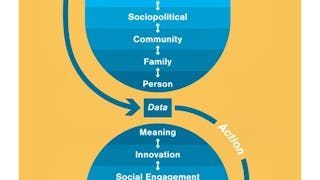This first of five courses introduces students to the social determinants of health, and provides an overview of the definitions and theoretical perspectives that will form the foundation of this specialization. The topics of this course include:

Enjoy unlimited growth with a year of Coursera Plus for $199 (regularly $399). Save now.

Introduction to Social Determinants of Health
This course is part of Social Determinants of Health: Data to Action Specialization


Instructors: Daniel J. Pesut, Ph.D., RN, FAAN
Included with
(15 reviews)
Skills you'll gain
Details to know

Add to your LinkedIn profile
See how employees at top companies are mastering in-demand skills

Build your subject-matter expertise
- Learn new concepts from industry experts
- Gain a foundational understanding of a subject or tool
- Develop job-relevant skills with hands-on projects
- Earn a shareable career certificate

There are 5 modules in this course
The purpose of this module is to provide an introduction to the social determinants of health in the context of this specialization. In lesson one, we will define the social determinants of health, explore how our understanding of social determinants has changed over time, and analyze the impact health inequity has on society. We will also consider the variety of transformational ideas that can be used to address health inequities. In lesson two, we will review different ways of knowing and how community knowledge can be augmented with data to influence policy. We will also evaluate defining characteristics of data, as we assess how data, analysis and partnership can be leveraged to create power for transformative change.
What's included
4 videos10 readings2 assignments1 discussion prompt8 plugins
The purpose of this module is to provide a foundation of theoretical knowledge to support systems thinking and knowledge management principles applied to determinants of health. Systems thinking involves making distinctions, understanding systems, relationships, points of view and perspective taking. In lesson one, we will learn about the DSRP theory in regard to developing a systems thinking mindset. In lesson two, we introduce the Data to Action Hourglass model as a conceptual framework and a way to think about the different logical levels and relationships between and among determinants of health.
What's included
2 videos4 readings2 assignments1 discussion prompt3 plugins
The purpose of this module is to introduce the concept of collective impact as a model and method for designing data driven collective impact initiatives. The principles and phases of collective impact are described and explained. Collective impact thinking requires a shift in mind that requires attention to systems thinking. Using a collective impact mindset supports and encourages collaboration and team science and the use of standardized data sets to understand and support knowledge work and translation with community and population data sets. Example case studies illustrate the power and potential of collective impact efforts to create transformational changes to support desired health care futures.
What's included
1 video6 readings2 assignments1 discussion prompt1 plugin
In this module we will define minority stress theory as it relates to the social determinants of health. In lesson one, we will define minority stress, and examine how systemic discrimination contributes to minority stress. We will also look at how minority stress can lead to health disparities. In lesson two, we will discuss the effects of structural inequalities on both advantage and disadvantaged groups. We will also explore the personal, interpersonal and social effects of minority stress. Finally, we will evaluate the personal and social resources available to counteract minority stress, as well as the ways in which data can be used to enact transformative changes.
What's included
2 videos2 readings2 assignments1 discussion prompt3 plugins
This module will focus on analyzing, displaying and interpreting social determinants of health data, with a particular focus on identifying social determinants of health in large datasets. Lesson one will provide an overview of frequency analyses and bar chart visualizations. In lesson two, we will learn how to use the R environment in Coursera. Lesson three will introduce us to the datasets, NHANES and Omaha System, which we will use throughout the Data Application modules in this specialization. In lesson four, we will learn how to conduct frequency analyses and create bar charts in R. Using the NHANES dataset, we will obtain the frequencies of income, education, family savings, depression and insurance by race. Using the Omaha System dataset, we will obtain the frequencies of common social determinants by both race and ethnicity. Finally, we will discuss how to interpret the results of our analysis as we visualize our findings using bar plots.
What's included
4 videos6 readings1 peer review1 discussion prompt1 ungraded lab4 plugins
Earn a career certificate
Add this credential to your LinkedIn profile, resume, or CV. Share it on social media and in your performance review.
Instructors


Offered by
Explore more from Health Informatics
 Status: Free Trial
Status: Free TrialUniversity of Michigan
 Status: Free Trial
Status: Free TrialUniversity of Minnesota
 Status: Free Trial
Status: Free TrialUniversity of Minnesota
 Status: Free Trial
Status: Free TrialUniversity of Minnesota
Why people choose Coursera for their career




Frequently asked questions
To access the course materials, assignments and to earn a Certificate, you will need to purchase the Certificate experience when you enroll in a course. You can try a Free Trial instead, or apply for Financial Aid. The course may offer 'Full Course, No Certificate' instead. This option lets you see all course materials, submit required assessments, and get a final grade. This also means that you will not be able to purchase a Certificate experience.
When you enroll in the course, you get access to all of the courses in the Specialization, and you earn a certificate when you complete the work. Your electronic Certificate will be added to your Accomplishments page - from there, you can print your Certificate or add it to your LinkedIn profile.
Yes. In select learning programs, you can apply for financial aid or a scholarship if you can’t afford the enrollment fee. If fin aid or scholarship is available for your learning program selection, you’ll find a link to apply on the description page.
More questions
Financial aid available,
¹ Some assignments in this course are AI-graded. For these assignments, your data will be used in accordance with Coursera's Privacy Notice.





